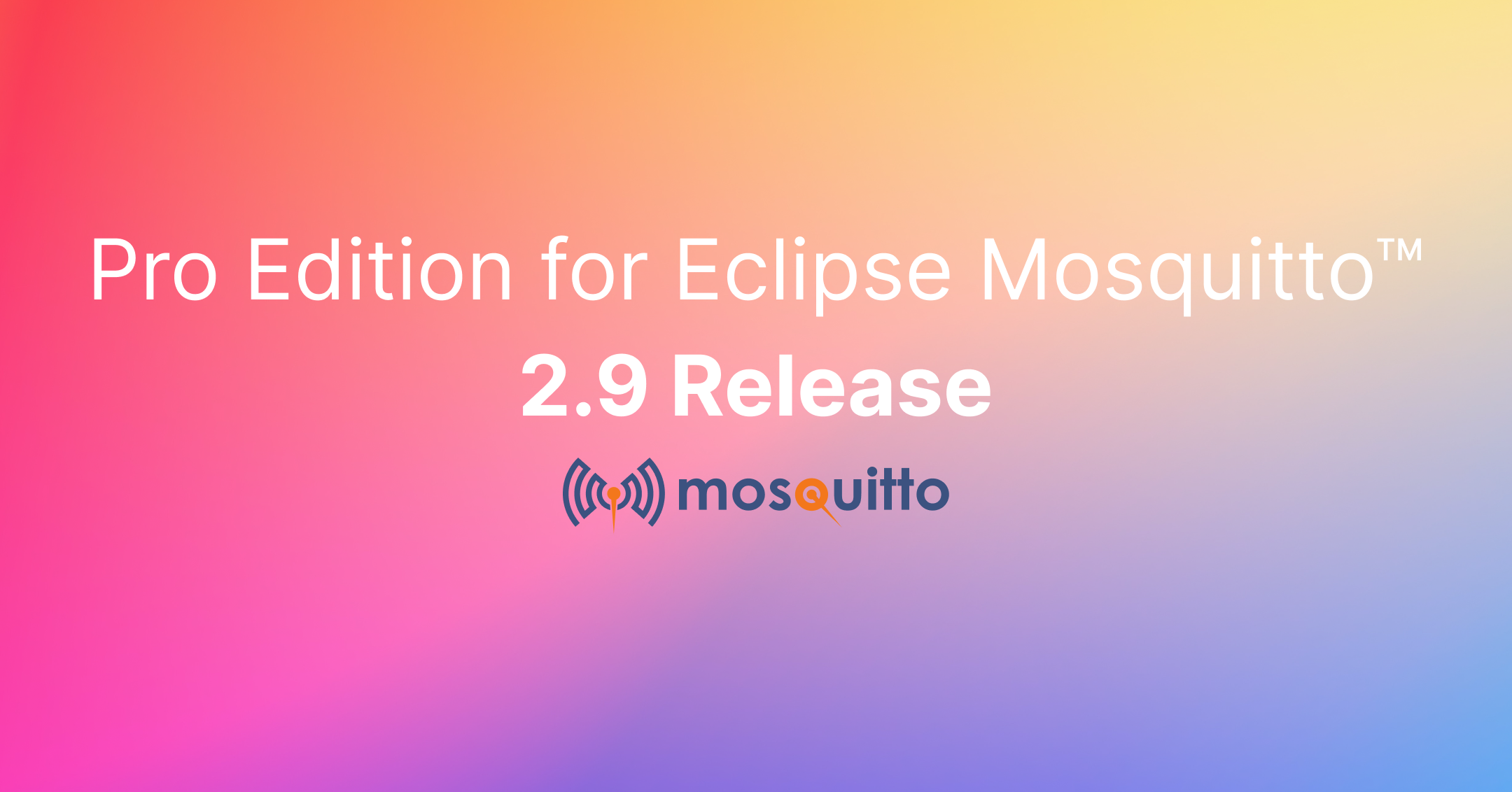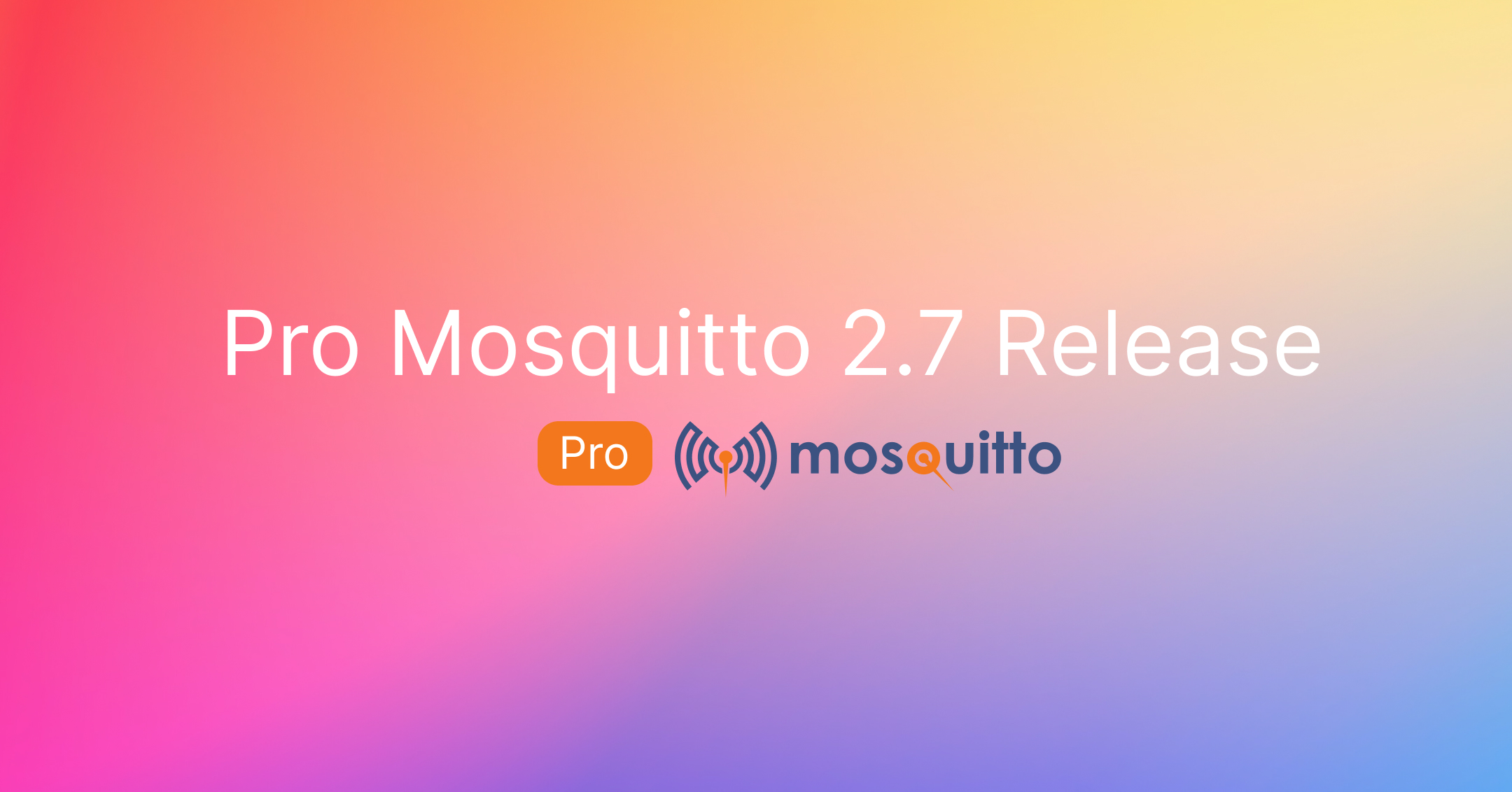Introducing Pro Mosquitto 2.8
Our team is happy to announce the release of the Pro Edition of Eclipse Mosquitto version 2.8. This release focuses on the launch of several new integrations, OpenShift deployment support and persistent queueing.
Let us dive deeper into the new features and functionality our team implemented as part of the recent version of Pro Mosquitto.
🛡️ Integrations
We are expanding our integration offerings! In addition to our existing bridges and integrations, we’re excited to announce the addition of five new database bridges, one new data streaming bridge, and one new monitoring integration.
🔄 Google Pub/Sub Bridge
Feature Description: Google Pub/Sub is a managed messaging service provided by Google that enables users to send and receive messages between independent applications asynchronously. The MQTT to Google Pub/Sub Bridge facilitates one-way data transfer from MQTT topics to Google Pub/Sub topics, ensuring seamless data transmission.
The MQTT to Google Pub/Sub Bridge allows users to:
- Specify the Google Pub/Sub server
- Choose the authentication method
- Select MQTT topics to publish
- Map MQTT topics to Google Pub/Sub topics
- Select Google Pub/Sub topics for consuming
- Map Google Pub/Sub topics to MQTT topics
User benefit: The MQTT to Google Pub/Sub Bridge simplifies bidirectional data transfer between MQTT sources (such as IoT devices and sensors) and Google Pub/Sub topics. Moreover, this integration streamlines data processes, enabling real-time data processing for immediate analytics and informed decision-making. It ensures adaptability and scalability for current and future data processing and integration needs.
Standard subscription plan availability:
- Instance: On-premises
- Subscription plan: L and Enterprise
- Instance: Cloud (Early Access*)
- Subscription plan: L and Enterprise
*Early Access refers to a feature that requires manual configuration to enable its use. Our customers are currently limited to using this service twice per month. However, these features will eventually transition to a full-fledged state, eliminating the need for manual configuration.
To learn more about the Google Pub/Sub bridge, see the documentation.
➡️ Google AlloyDB Bridge
Feature Description: Google AlloyDB is a scalable, fully managed relational database service designed to handle high volumes of data and support mission-critical applications with high availability and strong consistency. Additionally, the MQTT to Google AlloyDB Bridge enables seamless one-way data transfer from MQTT to Google AlloyDB, simplifying the management of MQTT-generated data within AlloyDB databases.
The MQTT to Google AlloyDB bridge allows users to:
- Specify the target Google AlloyDB database and table for data import.
- Specify the authentication credentials and certificates for secure integration.
- Map MQTT topics to corresponding Google AlloyDB tables for organized data storage.
- Opt for specific message fields to be inserted into Google AlloyDB tables based on individual preferences.
User benefit: The MQTT to Google AlloyDB Bridge streamlines the integration of MQTT data into Google AlloyDB databases, providing a user-friendly solution for efficient data storage. This integration facilitates streamlined data management and enables robust analytics, including historical data analysis, leading to valuable insights within your organization.
Standard subscription plan availability:
- Instance: On-premises
- Subscription plan: L and Enterprise
- Instance: Cloud (Early Access)
- Subscription plan: L and Enterprise
To learn more about the Google AlloyDB bridge, see the documentation.
Test the new Google Pub/Sub and Google AlloyDB bridges with a free 30-day trial of Pro Mosquitto on-premises by signing up here!
➡️ MySQL Bridge
Feature Description: MySQL is a widely used open-source relational database management system known for its reliability and scalability. The MQTT to MySQL Bridge is designed for seamless one-way data transfer from MQTT to MySQL, simplifying managing MQTT-generated data in MySQL databases.
The MQTT to MySQL bridge allows users to:
- Specify the target MySQL database and table for data import.
- Specify the authentication credentials and certificates for secure integration.
- Customize the import process by choosing specific MQTT topics and message fields.
- Map MQTT topics to corresponding MySQL tables for organized data storage.
- Opt for specific fields to be inserted into MySQL tables based on individual preferences.
User benefit: The MQTT to MySQL Bridge simplifies the process of integrating MQTT data into MySQL databases, providing a convenient solution for effective data storage. This integration enhances data management efficiency, enabling smoother analytics processes and unlocking valuable insights for your organization.
Standard subscription plan availability:
- Instance: On-premises
- Subscription plan: M, L, and Enterprise
- Instance: Cloud (Early Access)
- Subscription plan: M, L, and Enterprise
To learn more about the MySQL bridge, visit the documentation.
➡️ PostgreSQL Bridge
Feature Description: PostgreSQL is a powerful open-source object-relational database management system recognized for its advanced features and extensibility. The MQTT to PostgreSQL Bridge facilitates seamless one-way data transfer from MQTT to PostgreSQL, providing a straightforward solution for managing MQTT-generated data within PostgreSQL databases.
With the MQTT to PostgreSQL bridge, users can:
- Specify the target PostgreSQL database and table for data import.
- Specify the authentication credentials and certificates for secure integration.
- Customize the import process by selecting specific MQTT topics and message fields.
- Map MQTT topics to corresponding PostgreSQL tables for organized data storage.
- Define specific fields to be inserted into PostgreSQL tables based on individual preferences.
User benefit: The MQTT to PostgreSQL Bridge streamlines the incorporation of MQTT data into PostgreSQL databases, providing a user-friendly method for effective data storage. This integration promotes streamlined data management, empowering users with improved analytics capabilities and valuable organizational insights.
Standard subscription plan availability:
- Instance: On-premises
- Subscription plan: M, L, and Enterprise
- Instance: Cloud (Early Access)
- Subscription plan: M, L, and Enterprise
Visit the documentation to learn more about the PostgreSQL bridge.
➡️ TimescaleDB Bridge
Feature Description: TimescaleDB is a leading open-source time-series database built on top of PostgreSQL, designed for handling time-series data at scale with SQL simplicity. The MQTT to TimescaleDB Integration streamlines data flow from MQTT brokers to TimescaleDB, providing a robust solution for organizing and managing MQTT-generated data within TimescaleDB databases.
With the MQTT to TimescaleDB Integration, users can:
- Define the target TimescaleDB database for seamless data ingestion.
- Specify the authentication credentials and certificates for secure integration.
- Tailor the data ingestion process by specifying MQTT topics and message fields for extraction.
- Establish mapping between MQTT topics and TimescaleDB tables to ensure structured data storage.
- Configure specific fields for insertion into TimescaleDB tables based on individual requirements.
User benefit: The MQTT to TimescaleDB Bridge simplifies the incorporation of MQTT data into TimescaleDB databases, presenting a user-centric approach to effective data storage. This integration facilitates streamlined data management, empowering users with enriched analytics capabilities and actionable insights within their organization.
Standard subscription plan availability:
- Instance: On-premises
- Subscription plan: L and Enterprise
- Instance: Cloud (Early Access)
- Subscription plan: L and Enterprise
To learn more about the TimescaleDB bridge, visit the documentation.
➡️ MongoDB Atlas Bridge
Feature Description: MongoDB Atlas is a fully managed cloud database service for MongoDB, offering a flexible and scalable solution for modern application development. The MQTT to MongoDB Atlas Bridge is an extension to the MQTT to MongoDB Bridge released as a part of Pro Mosquitto version 2.7. This extension enables the one-way data transfer from MQTT to MongoDB Atlas, ensuring smooth integration for efficient data management and storage. This bridge simplifies the data migration process, allowing users to store MQTT-generated data within MongoDB Atlas effortlessly.
The MQTT to MongoDB Atlas Bridge allows users to:
- Specify the MongoDB Atlas database and collection for data import.
- Specify the authentication credentials and certificates for secure integration.
- Select MQTT topics and message fields to import into MongoDB.
- Map MQTT topics to specific collections within MongoDB.
- Choose which message fields to insert into MongoDB collections.
User benefit: The MQTT to MongoDB Atlas Bridge streamlines integration between MQTT and MongoDB Atlas, making it easy to store MQTT-generated data and enabling streamlined data management for in-depth analytics and valuable insights within your organization.
Standard subscription plan availability:
- Instance: On-premises
- Subscription plan: L and Enterprise
- Instance: Cloud (Early Access)
- Subscription plan: Enterprise
To learn more about the MongoDB Atlas bridge, visit the documentation.
📈 InfluxDB Metrics Exporter
Feature Description: InfluxDB is an open-source time-series database designed to handle high write and query loads, ideal for IoT, monitoring, and analytics applications. The InfluxDB Metrics Exporter for Pro Mosquitto collects comprehensive metrics related to Pro Mosquitto’s operation, including the number of connected clients, MQTT message types sent and received, and other relevant performance indicators, and allows exporting them from Pro Mosquitto to InfluxDB.
User benefit: Application monitoring is crucial for ensuring any service’s optimal performance and reliability of. By exporting metrics to InfluxDB, Pro Mosquitto users gain access to historical data for various metrics, enabling them to analyze trends, identify patterns, and make informed decisions for capacity planning and optimization. Additionally, monitoring with the InfluxDB Metrics Exporter allows users to detect and respond to abnormal behavior promptly, ensuring the stability and reliability of Pro Mosquitto in real time. Overall, this exporter empowers users with valuable insights into the performance and behavior of Pro Mosquitto, facilitating proactive management and optimization of their MQTT broker infrastructure.
Standard subscription plan availability:
- Instance: On-premises
- Subscription plan: S, M, L, and Enterprise
To learn more about the InfluxDB Metrics exporter, visit the documentation.
📈 Monitoring
📝 Enhanced High Availability (HA) Monitoring
Feature Description: The Enhanced High Availability (HA) Monitoring feature improves the monitoring capabilities of Pro Mosquitto by adding additional metrics output and cluster status indication for enhanced visibility into the HA cluster’s health and resilience. The feature includes metrics output for the current number of voting nodes and the number of voting nodes currently in contact with the leader. These metrics are available in multiple locations, including published topics and Prometheus plugin identifiers. Additionally, the feature provides an indication of the current cluster status, accessible only on the leader node. This status indicates whether the cluster is stable, degraded, or offline, allowing users to assess the health of their HA setup.
User benefit: The Enhanced High Availability (HA) Monitoring feature offers several benefits to users:
- Improved Visibility: Users gain enhanced visibility into the health and resilience of their HA clusters through additional metrics output and cluster status indication.
- Real-time Insights: Users can monitor the current number of voting nodes and their connectivity to the leader in real time, enabling proactive identification of potential issues or risks.
- Proactive Management: The indication of the current cluster status allows users to proactively address any issues, ensuring continuous availability and reliability of their MQTT broker infrastructure in HA deployments.
Standard subscription plan availability:
- Instance: On-premises
- Subscription plan: High Availability version of S, M, L, and Enterprise
- Instance: Cloud
- Subscription plan: High Availability version of S, M, L, and Enterprise
To learn more about Enhanced High Availability (HA) Monitoring, visit the documentation.
📦 Deployment & Containerization
🚀 OpenShift
Feature Description: OpenShift is a containerization platform developed by Red Hat based on Kubernetes. OpenShift support enables users to install and run Pro Mosquitto within OpenShift clusters. This feature ensures seamless integration with the OpenShift container platform, allowing users to deploy and manage Pro Mosquitto alongside other applications in OpenShift environments.
User benefit: OpenShift support for Pro Mosquitto simplifies instances’ deployment, management, and scaling within OpenShift clusters. This support ensures that users can efficiently harness the power of Pro Mosquitto in a containerized environment, facilitating secure and scalable functionality for their applications and services.
Standard subscription plan availability:
- Instance: On-premises
- Subscription plan: Enterprise
To test OpenShift support in Pro Mosquitto 2.8, sign up for a free 30-day on-premises trial here.
Additional Features
🧳 Persistent Queueing
Feature Description: The introduction of Persistent Queueing in Pro Mosquitto represents a significant enhancement, allowing messages to be queued to disk rather than solely stored in memory. This key difference enables the storage of multiple terabytes of queued messages, overcoming previous limitations associated with RAM space. With this capability, Pro Mosquitto can now retain a large number of outgoing messages per client and MQTT bridge. This ensures reliable delivery even in environments with unstable connectivity.
User benefits:
- Increased Message Storage Capacity: The ability to queue messages directly to disk significantly expands the MQTT broker’s storage capacity, allowing for the retention of multiple terabytes of queued messages. This ensures that a vast amount of data can be stored and reliably delivered to offline clients and MQTT bridges, improving overall message delivery resilience.
- Enhanced Reliability in Unstable Environments: The MQTT broker can maintain message delivery integrity by storing messages directly to disk, even in environments with unstable connectivity. This ensures messages are not lost and can be reliably delivered once the connection is reestablished, enhancing overall message delivery reliability.
- Efficient Resource Utilization: The MQTT broker can store queued messages on disk, optimizing resource utilization by offloading message storage from RAM space. This allows for more efficient memory management and ensures that the broker can handle large volumes of messages without being constrained by memory limitations.
- Scalability for Future Growth: The adoption of persistent queueing enables the MQTT broker to scale effectively to accommodate future growth and increasing message volumes. The ability to store messages directly to disk ensures that the broker can handle expanding data requirements without encountering scalability issues related to memory constraints.
Overall, implementing persistent queueing with disk storage in Pro Mosquitto significantly improves message storage capacity, reliability, resource utilization, and scalability. This offers users a robust solution for managing queued messages in diverse deployment environments.
Standard subscription plan availability:
- Instance: On-premises
- Subscription plan: Enterprise
To learn more about Persistent Queueing in Pro Mosquitto 2.8, visit the documentation.
🔧 Bug fixes
We are constantly working on improving our product’s performance and stability. This release includes various bug fixes and stability improvements that will enhance our users’ overall experience.
Start harnessing the full power of Pro Mosquitto 2.8 today by signing up for a free on-premises trial!
About the author
Philip Ackermann is the Chief Technology Officer (CTO) at Cedalo, bringing over 20 years of software development experience to the team. During his 11 years at the Fraunhofer Institute, specializing in Web Compliance and IoT technologies, he focused on software engineering, software architecture, and product development.
In addition to that, Philip is a published author, having written five books on software development, covering topics such as Java, JavaScript, Node.js, and Fullstack web development. Two of these books have been translated into English, broadening their global impact and enriching the international software development community.





